Hadith About Sayyidul Istighfar. | Alhamdulillah, all praise be to Allah SWT, blessings and salutations to the great master Prophet Muhammad SAW, his family members SAW, his companions SAW and those who follow in his footsteps.
In our lives, we need to apologize to Allah SWT a lot, which is to ask Him for forgiveness for all the sins and mistakes we have made. This is because, the Prophet SAW who is known that Allah SWT has forgiven his past and future sins never left this istighfar.
Hadith About Sayyidul Istighfar
In a hadith, it is said that the Prophet SAW apologized more than 70 times a day as narrated in Sahih Imam al-Bukhari:
From Abu Hurairah RA, that he heard the Prophet SAW say:
وَاللَّهِ إِنِّي لَأَسْتَغْفِرُ اللَّهَ وَأَتُوبُ إِلَيْهِ فِي اليَوْمِ اَكْثَرَ مِنْ سَبْعِينَ مَرَّةً
Meaning: "For the sake of God, I truly apologize to God and ask for His forgiveness every day more than 70 times". [Reported by al-Bukhari (6307)]
This shows the importance of istighfar in our daily lives. Based on the question above, there is a hadith that tells about Penghulu Istighfar or he is named as Sayyid al-Istighfar.
From Syeddad bin Aus RA, that the Prophet SAW said:
Meaning: "Sayyid al-Istighfar, you should say: Ya Allah, You are my Rabb, there is no God that has the right to be worshiped except You. You created me and I am Your servant. I am above Your covenant and Your promise is according to my ability. I seek refuge in You from the badness of my actions, I acknowledge Your favors to me and I acknowledge my sins to You, so forgive me. This is because, no one can forgive sins but You". [Narrated by al-Bukhari (6306)]
In Fath al-Bari, Imam Ibn Hajar quoted the words of Ibn Jamrah who said that in this hadith, the Prophet SAW has gathered the art of meanings and beautiful expressions and thus deserves to be called the leader of all istighfar. In addition to that, there is a pledge to the One God of His Oneness and also Ubudiyyah to Him (who alone has the right to be worshipped).
From Abu Hurairah RA, that he heard the Prophet SAW say:
وَاللَّهِ إِنِّي لَأَسْتَغْفِرُ اللَّهَ وَأَتُوبُ إِلَيْهِ فِي اليَوْمِ اَكْثَرَ مِنْ سَبْعِينَ مَرَّةً
Meaning: "For the sake of God, I truly apologize to God and ask for His forgiveness every day more than 70 times". [Reported by al-Bukhari (6307)]
This shows the importance of istighfar in our daily lives. Based on the question above, there is a hadith that tells about Penghulu Istighfar or he is named as Sayyid al-Istighfar.
From Syeddad bin Aus RA, that the Prophet SAW said:
Meaning: "Sayyid al-Istighfar, you should say: Ya Allah, You are my Rabb, there is no God that has the right to be worshiped except You. You created me and I am Your servant. I am above Your covenant and Your promise is according to my ability. I seek refuge in You from the badness of my actions, I acknowledge Your favors to me and I acknowledge my sins to You, so forgive me. This is because, no one can forgive sins but You". [Narrated by al-Bukhari (6306)]
In Fath al-Bari, Imam Ibn Hajar quoted the words of Ibn Jamrah who said that in this hadith, the Prophet SAW has gathered the art of meanings and beautiful expressions and thus deserves to be called the leader of all istighfar. In addition to that, there is a pledge to the One God of His Oneness and also Ubudiyyah to Him (who alone has the right to be worshipped).
Furthermore, in it there is recognition (from the servant) that Allah is the creator and pledges to the promise taken by Allah on him. In addition, submit to what God has decreed for him and ask for protection (from God) from all the evil that a servant does against him. In it there is also a reliance on pleasure to His creator and also a reliance on sin to the perpetrator as well as his desire to ask for forgiveness and recognition of the sins he has committed that no one is able to forgive those sins except Allah SWT. [See: Fath al-Bari, 100/11]
In this hadith also, the Prophet SAW stated the advantages for those who do charity with Sayyid al-Istighfar.
The words of His Majesty SAW again in the same hadith:
Meaning: "Whoever recites it (Sayyid al-Istighfar) during the day and believes in it, then he dies on that day before evening, then he is included among the inhabitants of heaven. And whoever recites it at night with full confidence and then dies before morning, then he is among the inhabitants of paradise".
Among other advantages stated in the hadith:
From Ibn Abbas RA, that the Prophet SAW said:
مَنْ لَزِمَ الِاسْتِغْفَارَ, Jَعَلَ اللَّهُ لَهُ مِنْ كُلِّ ضِيقٍ مَخْرَجً, وَمْ ُلِّ هَمٍّ فَرَجًا, وَرَزَقَهُ مِنْ حَيْثُ لَا يَحْتَسِبُ
It means: "Whoever is (always) asking for forgiveness, Allah SWT makes for him a way out of every difficulty, every worry is a relief and Allah also grants him sustenance from an unexpected direction". [Riyayat Abu Daud (1518)][According to Shaykh Syu'aib al-Arna'outh: The sanad is weak because one of the narrators named al-Hakam bin Mus'ab is jahalah (unknown) as stated by Imam al-Zahabi]
According to Sheikh Muhsin al-'Abbad al-Badr when lecturing on this hadith said:
"Although this hadith is weak from the point of view of its chain of transmission, its meaning is found in the Qur'an when discussing piety in surah al-Thalaq 2 to 3. In addition, in the Qur'an it is also stated that istighfar is the reason for getting sustenance as in Surah Nuh verses 10 to 12".
SAYYIDUL ISTIGHFAR PRONOUNCED:
Advantages of Sayyidul Istighfar.
In this hadith also, the Prophet SAW stated the advantages for those who do charity with Sayyid al-Istighfar.
The words of His Majesty SAW again in the same hadith:
Meaning: "Whoever recites it (Sayyid al-Istighfar) during the day and believes in it, then he dies on that day before evening, then he is included among the inhabitants of heaven. And whoever recites it at night with full confidence and then dies before morning, then he is among the inhabitants of paradise".
Among other advantages stated in the hadith:
From Ibn Abbas RA, that the Prophet SAW said:
مَنْ لَزِمَ الِاسْتِغْفَارَ, Jَعَلَ اللَّهُ لَهُ مِنْ كُلِّ ضِيقٍ مَخْرَجً, وَمْ ُلِّ هَمٍّ فَرَجًا, وَرَزَقَهُ مِنْ حَيْثُ لَا يَحْتَسِبُ
It means: "Whoever is (always) asking for forgiveness, Allah SWT makes for him a way out of every difficulty, every worry is a relief and Allah also grants him sustenance from an unexpected direction". [Riyayat Abu Daud (1518)][According to Shaykh Syu'aib al-Arna'outh: The sanad is weak because one of the narrators named al-Hakam bin Mus'ab is jahalah (unknown) as stated by Imam al-Zahabi]
According to Sheikh Muhsin al-'Abbad al-Badr when lecturing on this hadith said:
"Although this hadith is weak from the point of view of its chain of transmission, its meaning is found in the Qur'an when discussing piety in surah al-Thalaq 2 to 3. In addition, in the Qur'an it is also stated that istighfar is the reason for getting sustenance as in Surah Nuh verses 10 to 12".
Sayyidul Istighfar, the Chief of Istighfar
SAYYIDUL ISTIGHFAR PRONOUNCED:
It means:
Oh GOD, You are my God, There is no God but You, You are the one who made me. While I am YOUR servant and I am in YOUR grip and in the covenant of loyalty (believing and obeying) to YOU as much as I can.
I seek refuge in YOU from the evil I have done. I confess for all the favors you have given me and I confess all my sins. So forgive me. Indeed, no one can forgive all sins except You.
READING TIME: After dawn and afternoon.
In conclusion, istighfar is very important because it has many advantages. In addition to that, we as ordinary human beings who do not run away from making mistakes and mistakes must practice istighfar in our daily lives. Furthermore, istighfar has many pronunciations and is not limited to just one pronunciation. Finally, may Allah SWT make us among His servants who always seek istighfar and classify us among the inhabitants of heaven. Amen
Let's all continue to practice, may all difficulties be removed, all narrowness be cleared, all burdens in life be lightened. Amen.
Also read : Selawat Tafrijiyah and it Benefits in Life
Source:






Thank you for dropping by. All comments are fully your responsibility.
Any comments are subjected to the Act 588 MCMC 1988. Comment wisely, and do it with open heart!
Happy Blogging.
For any inquiries, email : shamiera_osment@yahoo.com